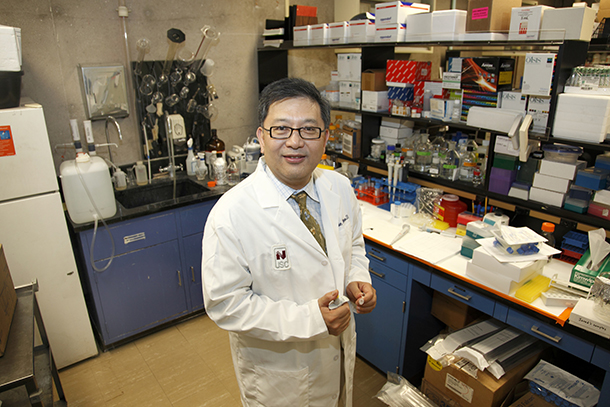A pioneering study co-authored by USC School of Pharmacy associate professor Stan Louie, PharmD, PhD, sheds light on why overweight patients often face greater challenges in overcoming cancer. The research, published in the American Association for Cancer Research journal Molecular Cancer Research, shows that adipocytes, otherwise known as fat cells, can absorb the chemotherapeutic agent daunorubicin, reducing the drug’s effectiveness.
While previous research had associated obesity with poorer outcomes for patients with breast, colon, ovarian, prostate and other cancers, this new study is the first to identify adipocytes as the potential culprit. The investigation involved coculturing human acute lymphoblastic leukemia (ALL) cell lines with adipocytes and treating them with daunorubicin, a major component in ALL therapy. The scientists then examined whether fat tissue from human cancer patients could not only take up the daunorubicin but also breakdown the chemotherapy. They measured the presence of daunorubicin through flow cytometry and liquid chromatography/mass spectrometry, where the breakdown of the chemotherapy was significantly different in fat versus non-fat tissues.
The team found that enzymes in the adipocytes break down daunorubicin into none effect compound unable to kill leukemia cells. The results may explain why obese young people treated for leukemia relapse at a rate nearly 50 percent higher than their thinner peers.
While the research identifies a longstanding mystery, it is still only a first step, according to Louie. “We now know that fat cells can help leukemia survive and proliferate in the presence of chemotherapy. This mechanism of drug-resistance is applicable to other cancers to survive,” he said. “Now we must probe more deeply and find treatment strategies that will enable us to overcome this obstacle.”
This study has allowed the team to secure a National Cancer Institute-funded project to develop methods to overcome the impact of fat-mediated drug resistance. This multidisciplinary study was conducted in conjunction with faculty members in The Saban Research Institute at the USC-affiliated Children’s Hospital Los Angeles and UCLA.
“This project demonstrates how our faculty members go beyond intersecting disciplines to partner with other institutions in driving innovation to improve patients’ lives,” said USC School of Pharmacy Dean Vassilios Papadopoulos, DPharm, PhD.


